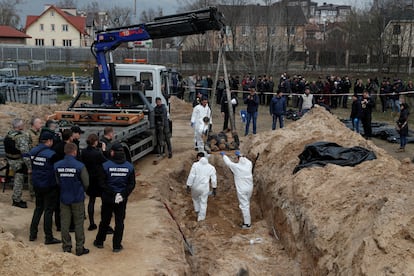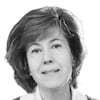Ukraine: How to prove a war crime
While the Russian invasion rages on, international authorities collect evidence of atrocities


Establishing whether a war crime has taken place requires extensive and specialized forensic work, and the current conflict in Ukraine, where a number of atrocities have already been alleged, is no exception.
Since the Russian invasion of the country on March 2 a team from the International Criminal Court (ICC) prosecutor’s office has been collecting evidence in Ukraine of possible war crimes or crimes against humanity. Ukrainian authorities are also asking the population to collect data while the United Nations Human Rights Council has established a commission of inquiry.
These efforts are intended to identify those most responsible for atrocities such as the bombing of the train station in the Ukrainian city of Kramatorsk, which last Friday killed at least 52 people, or the massacre in the the town of Bucha, on the outskirts of Kyiv. On Tuesday the president of the United States, Joe Biden, described the actions in Ukraine instigated by the Russian president, Vladimir Putin, as genocide.
As hostilities continue and the number of refugees already exceeds 4.6 million according to calculations by the United Nations, time and strong coordination are essential to the forensic investigation. Tore Soldal, a deputy police chief in Oslo, says that, while investigating war crimes has much in common with that of ‘ordinary’ crimes, there are clear distinctions: “It’s not about going, collecting evidence and coming back for analysis. You’re doing it all on the ground while a war is going on. You have to talk to hundreds of witnesses and survivors, including discerning whether they have political interests so as not to hinder the search for the truth,” he says by phone.
Soldal, a former investigator (1997-2009) at the International Criminal Tribunal for the former Yugoslavia (ICTY), notes that, when the ICTY arrived in the Balkans, it was already possible for his team to work safely.
“Although the war lasted several years [between 1991 and 2001], we were protected by the UN forces and we had the help of the local police. Thousands of bodies buried in mass graves had to be exhumed. Let’s hope it doesn’t happen now on that scale. On Ukrainian territory, at the moment, everything seems more difficult,” he says.
Forensic investigation goes beyond determining cause of death of the origin of an injury. Together with physical samples (preserved and in good condition), analysts look at everything from images taken by satellites to written speeches and audio recordings. Local police records from the scene of the crime are scrutinized, translators are recruited to collect the testimony of those who have fled to other countries, and artificial intelligence is deployed to try to recognize the suspects – everything and anything that serves to demonstrate the crime and the intention of its alleged perpetrators is in play. The ICC prosecutor’s office has opened a digital portal and invited people with information about what is happening in Ukraine to submit.
Culpability of political leaders
Soldal says it is absolutely possible to directly identify the architects of a war crime - who they are, where they were, what they did.
The focus is on the authority. “Since there is a high command who directs the troops, it is not necessary to prove that an officer committed a crime on their own. It is enough to show that he was in a position to control the soldiers who did it.”
The expert investigator says the biggest problem is linking political leaders to the crimes.
“[Slobodan] Milosevic went from president of the Federal Republic of Yugoslavia to president of Serbia, serving under both constitutions,” says Soldal. The ICTY “had to certify that Milosevic gave the orders, or that he commanded those who gave them. It was complicated.”
According to Soldal, “it’s possible” Putin could be judged now, but if so the proof will be in Russia where investigators would discern the type of command conferred by the Constitution, the support he has, and if he commands the soldiers.
In the case of the Balkans conflict, Soldal recalls that he was working “at least 150 days a year for 13 years”. Once the evidence arrived in the Dutch city of The Hague, headquarters of the ICTY, the material was gathered and sorted in a special room where criminal, military, or experts in what he calls “open sources” worked. This is where media images fit in to help prove war crimes.
Karim Khan, chief prosecutor of the ICC, has said he is seeking the collaboration of the Russian authorities to contribute evidence in the current crisis.
Soldal recalls that former Serbian President Milosevic was only handed over by Serbia in 2001, when he was no longer in power, and that, prior to this, Belgrade did not cooperate.
Accused of genocide and war crimes, Milosevic died in his cell in The Hague in 2006, without having been sentenced.
For British jurist Geoffrey Nice the slowness of the ICTY process has itself been an injustice to victims and there ought to be greater diligence in investigating crimes in the current Ukraine conflict.
“Dickens was already mocking the slowness of justice in Victorian times”, says Nice. In future, “the time spent undertaking the Balkan trials will be seen as an embarrassment and a shame.”
Nice acted as chief prosecutor in the trial against the former Serbian president, and has a clear opinion of the war in Ukraine: “This is a case of a crime of aggression committed by Russia, which is guilty, against Ukraine, which is innocent. War crimes have been seen from the beginning of the conflict, as have almost certainly crimes against humanity. The important thing is that the world’s judgement continues to be in favour of Ukraine and does not have to wait for processes that may not take place. Putin may never be handed over to international justice; we will have to accept that.”
Nice adds that, after the Nuremberg processes, “the winners and losers of World War II made progress from 1946 onwards: among other reasons this was because it was clear who was on the right side and who was wrong.”
Tu suscripción se está usando en otro dispositivo
¿Quieres añadir otro usuario a tu suscripción?
Si continúas leyendo en este dispositivo, no se podrá leer en el otro.
FlechaTu suscripción se está usando en otro dispositivo y solo puedes acceder a EL PAÍS desde un dispositivo a la vez.
Si quieres compartir tu cuenta, cambia tu suscripción a la modalidad Premium, así podrás añadir otro usuario. Cada uno accederá con su propia cuenta de email, lo que os permitirá personalizar vuestra experiencia en EL PAÍS.
¿Tienes una suscripción de empresa? Accede aquí para contratar más cuentas.
En el caso de no saber quién está usando tu cuenta, te recomendamos cambiar tu contraseña aquí.
Si decides continuar compartiendo tu cuenta, este mensaje se mostrará en tu dispositivo y en el de la otra persona que está usando tu cuenta de forma indefinida, afectando a tu experiencia de lectura. Puedes consultar aquí los términos y condiciones de la suscripción digital.








































